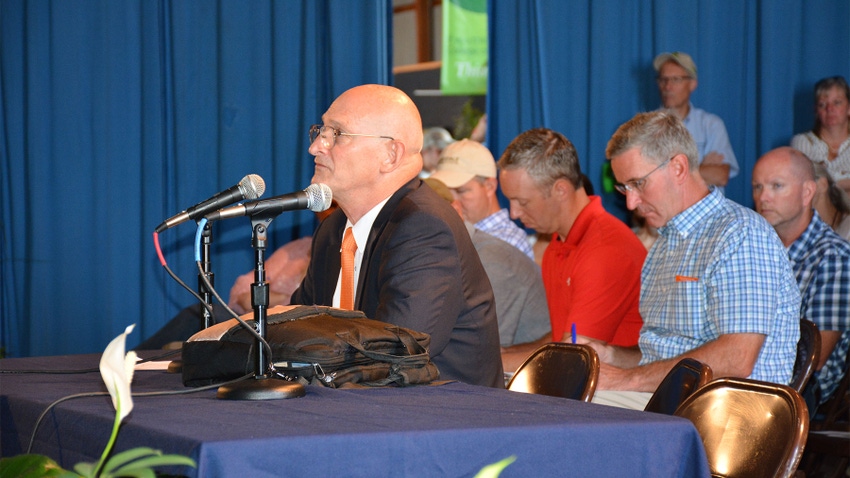
They say, “Home is where the heart is.” For Richard Roush, home will be Australia, where he plans on spending more time with his children and grandchildren.
Roush is retiring from Penn State after nearly nine years as dean of the College of Agricultural Sciences. He plans to stay on as a transition consultant through the end of the year before making the move to Australia.
The college is an important resource for agricultural education and research not only in the state, but also across the region. There’s been a lot of changes since Roush took over.
Cooperative Extension, where most producers have a connection with the college, has gone from a county-based model to a more regional model.
There are also many new faces in Extension as county educators who cultivated relationships with farmers for decades have either retired or moved on to better-paying jobs.
Roush says the college is more diverse than ever. When he arrived, only 17% of the faculty were women. Today, that number is 35%.
While undergraduate enrollment in the college has remained steady — about 2,000 to 2,100 new students a year — graduate student numbers have increased.
“When I arrived, the strategic plan for the college, and this was written before I arrived, called for 500 grad students,” Roush says. “We kept getting around 400 or so grad students, so this was a priority. In the last year, we had a record 550 grad students, which is quite impressive. The grad students in many ways are a major engine room for our research, but they are also great ambassadors for us when they leave. The graduate student numbers, and where they go afterward, is a good indicator of how healthy the college is.”

BACK TO AUSTRALIA: Roush, who came to Penn State nine years ago, says that he plans to stay on as a transition consultant through the end of the year before making the move to Australia with his family.
Roush says he is going to Australia to spend more time with his children and grandchildren, and to do more applied research in entomology.
In this interview, he shares his take on the state of the college and Cooperative Extension, and some of the biggest issues he sees facing agricultural education:
Where are you seeing growth in the College of Agricultural Sciences? We’re seeing the most growth in probably veterinary and biomedical sciences, and animal sciences. They've been high all along but probably growing more. They each have more than 300 majors in them.
We have other departments that have sort of topped out at where they feel they can, with facilities and so forth, have topped out at number of students they can carry.
But plant sciences and forestry, where the industry demand for undergrads is very high, we could use all the help we can get to encourage more students to look into those areas; crop agronomy, breeding … forages to support the growing livestock industry. And in forestry, there is huge demand among state and federal employers, as well as industry.
What would you describe as your biggest accomplishment since you arrived? I think the work we've done on water quality is something I’m pretty proud of. And there is much to do.
We're making progress on cleaning up streams and rivers, but there is a long way to go on it. I'm really pleased the college is doing well on this. We recently got a new grant, state government set aside some funding to specifically target more water quality stuff, and actually wrote in legislation for the colleges to be a part of training people in the counties and to provide a consistent base of training capability support for all the counties and their efforts.
I think we've made a lot of headway in putting down the ground rules, or foundations, for those stronger programs, and we're making some headway in reducing the pollution of waterways and the bay, but we still need to keep going and delivering on it.
What areas of ag research need to be explored? With increasing temperatures and even more extreme climatic events, I think there is a greater opportunity and even an obligation for Pennsylvania to improve its food production capabilities.
In that regard, I think there is a lot of opportunity to do more to develop ag in western Pennsylvania. In the future, it will be warm enough in the Southern states that it will create increasing stress on the animal populations, so we can do more with animal agriculture in western Pennsylvania. We could design it better than, say, things were designed in the southeastern part of the state.
What do you think is the state of agricultural education? I think it's pretty strong across the U.S. The big challenge that the land grants have, and that's coming on point with the farm bill this year, is that the facilities, the research facilities across the U.S., have declined over time.
I worked at six land grants in the U.S., traveled and visited many more. I've been able to watch over a long time what's been happening with facilities. And it's very clear that we're having a lot of deferred maintenance, putting us in an awkward position of maintaining a high level of research quality.
Both China and the EU are spending more on agricultural research than the U.S. is. And there have been audited studies that have shown that we are $11 billion behind in maintenance on buildings.
How about the state of Extension in Pennsylvania and elsewhere? Over the last eight years, the college has invested heavily in coordinating Extension efforts more and doing a lot of things in digital education. When I first got here, I think there were a lot of people, even in Extension, pushing back that we were not going to replace traditional meetings with farmers and so forth, not that we were proposing it would.
There was a reluctance to jump onto it, but we had a lot of infrastructure in place, and we were prepared for COVID and very quickly pivoted to getting more and more of our materials out digitally instead of in person.
We still don't believe it's going to replace face-to-face meetings, but the way I was looking at it was the more we can do with on-demand digital learning for routine questions, the better off we’ll be able to focus the rest of the resources we have left on the really difficult problems.
Extension nationally needs to do a better job of grooming people for leadership roles in Extension and the vision that's going to be needed into the future, as the needs expand and diversify for Extension. But I think the weakness nationally is somehow we're not training the leadership for the future very well. Or at least recruiting them to leadership roles for the future.
About the Author(s)
You May Also Like






